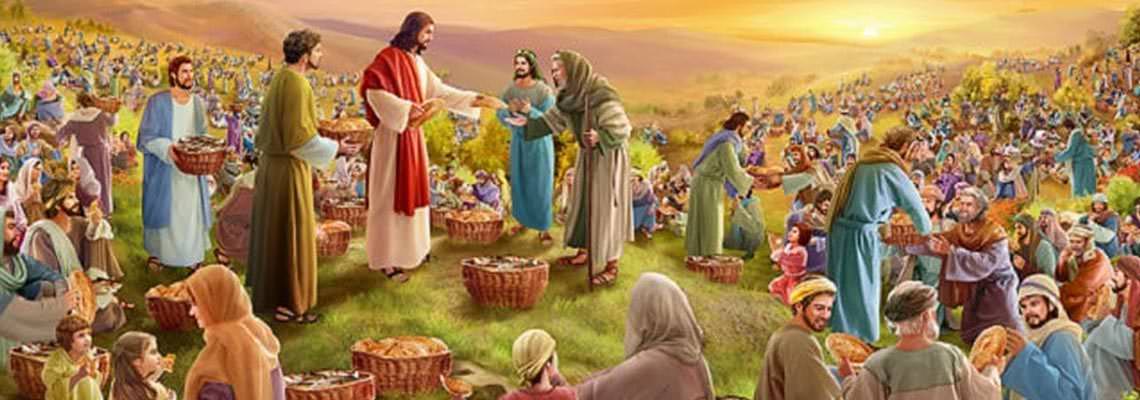It is 2nd August 2020. The readings are from Isaiah 55:1-3; the second reading is from Romans 8:35, 37-39; and the Gospel from Matthew 14:13-21.
God is concerned about us. To find meaning in life is to find God. God’s perception is wider than our narrow and selfish receptions. God’s mercy moves in to fill the emptiness of human helplessness. The eyes of all look to you, and you give them their food in due season.” (Ps.145:15)
Albert Einstein said once: “Creativity is contagious, pass it on.” But the readings suggest that compassion is contagious, pass it on. A visible divine hospitality and a demand for human responsibility towards hunger are the message of the eighteenth Sunday of the ordinary time. Mahatma Gandhi reminds us, “The world has enough for everybody’s needs, not for every body’s greed.” St.Teresa of Calcutta points out, “When a poor person dies of hunger, it has not happened because God did not take care of him or her. It has happened because neither you nor I wanted to give that person what he or she needed.” Jesus said, “whatever you do for the least of these, you do for me.” (Mt.25:40).
The first reading displays the lavishing generosity of God in loving us.
In the second reading, God assures that there is nothing can stop loving us. St. Paul consoles us that nothing an separate us from the love of Christ.
A man asked God, if you care for humanity, why there is so much of hunger, thirst and poverty looming everywhere? God replied him: that is why I created you. “Take care to guard against all greed, for though one may be rich, one’s life does not consist of possessions.” (Lk. 12:15).
We have more than one example in the Scripture in responding generously to the need of the hour and the other. Abraham extended his hospitality to three divine persons. (Gen.18:1-14), Zacchaeus who was willing to give to the poor. (Lk.19:8), Mother Mary gave her entire self for the humanity. (Lk.1:38)
“Those who eat of me will hunger for more, and those who drink of me will thirst for more.” (Sir.24:21). We are set on fire of love to share what we have by the divine food. Jesus cried out, “Let anyone who is thirsty come to me.” (Jn.37). The hunger for love and the indifferent towards the pain and suffering of the other is
God walks an extra mile to meet our needs of our lives. God invites us all those who are hungry and thirsty to have their fill for free. “You received without payment; give without payment.” (Mt.10:8).
As the responsibility of feeding our souls and spirits rest in God, so the moral duty to feed the hungry stomachs is upon us all who have received the bountiful gifts of God from the Heart of the Saviour.
The initiative of feeding our inner beings is an inspiration for us to begin feeding the poor around.
Ignoring the hungry is being indifferent to a loving God. God never remains silent when God’s children are deprived of the Word of God, and therefore we cannot remain unaffected when we hear, read and know about the those who are going to bed without a plate of meal.
Charity begins at home. Let us begin right from here where we live, earn, and enjoy life. The global hunger is on the rise every day. It is so painful to enumerate the rising statistics and numbers of those who are going hungry during the pandemic. The World Food Programme suggests that the coronavirus pandemic will trigger famines of “biblical proportions.” Hunger to kill 128,000 more children over pandemic’s first year. In the Middle East, a Venezuela scenario looms over Lebanon, Syria, and Yemen. “For I was hungry, and you gave me food, I was thirsty, and you gave me something to drink, I was a stranger and you welcomed me.” (Mt.25:35). What is our personal contribution to eliminate hunger to give human life to thrive with dignity without polluting the nature?
When physical hunger is undermined, spiritual hunger is ignored.
Today’s reading invites us to reflect the hunger deeper than peripheral. “O God, you are my God, I seek you, my soul thirsts for you; my flesh faints for you, as in a dry and weary land where there is no water.” (Ps.63:1). 156. The prayerful reading of God’s word, which is “sweeter than honey” (Ps 119:103) yet a “two-edged sword” (Heb 4:12), enables us to pause and listen to the voice of the Master. It becomes a lamp for our steps and a light for our path (cf. Ps 119:105). (Gaudete Et Exsultate,156).
“The path of holiness is a source of peace and joy, given to us by the Spirit. At the same time, it demands that we keep “our lamps lit” (Lk 12:35) and be attentive. “Abstain from every form of evil” (1 Thess 5:22). “Keep awake” (Mt 24:42; Mk 13:35). “Let us not fall asleep” (1 Thess 5:6). “This is a person who loves the brethren and prays much for the people” (2 Mac 15:14). (Gaudete Et Exsultate,164).”
“Be merciful, just as your Father is merciful.” (Lk.6:36).
The episode of feeding the five thousand highlights compassion, sharing and the Eucharist. Jesus felt for their hunger. It is the story of God’s caring and compassion.
All four gospels it is mentioned the story of multiplication of bread insisting the importance of God’s compassionate Heart displayed by the gesture of Jesus.
Spiritual and physical hunger is taken care by God and Jesus.
Jesus said to them, “There is no need for them to go away; give them some food yourselves. ”
The enormously affectionate generosity of God unfolded with the manna in the wilderness (Ex.16) continued through the miracle of the prophet Elisha (2 Kgs. 4:42-44) leading us to the table of the Eucharist.
the theological significance is the way in which the episode anticipates the institution of the Eucharist. Jesus’ gestures of ‘taking (the loaves)’, ‘blessing’, ‘breaking’, ‘giving’ – foreshadow those at the Last Supper (Matt 26:26). Fr. Arrupe remarks, ‘The Eucharist will never be complete so long as people still go hungry in our world’.
Even though Jesus was in grief for the murder of John the Baptist, He was so sensitive to the need of the people who were looking for Him. The waves of sadness, grief, and loss cannot blind the pain and hunger of those around us. Our providing from meagreness is the beginning of miracle of compassion and multiplication of love. St. John Paul II taught us, “Place your lives in the hands of Jesus. He will accept you and bless you beyond your greatest expectations.” (John Paul, Scotland, 1982). No one can say that they so little that they cannot share. “Truly I tell you, this poor widow has put in more than all of them; (Lk.21:3).
The heightened emotional and spiritual hunger is witnessed in the contemporary interactions. The evolution of human intelligence spreads through the emotional, spiritual, social and environmental fabrics of human relationships.
We cannot always expect God to do something. The reading inspires every one of us to do our part however insignificant it might be. It is better something than nothing at all. Giving with love matters than quantity without compassion. Our life becomes meaningful, satisfying and fulfilling when we serve the community, country, and God by taking care of the hunger of human heart. Victor Frankl convinces us, “Being human is always directed and pointing to someone other than oneself.”
God wants to do extraordinary things with the ordinary people like us. The nourishing love of God enriches the streams of love to share with the others in need.
Let us reach out to someone who is hungry and thirsty today after the Eucharistic banquet. Let us use all means to reach out to that family member who we deprived them of love, care and compassion. May our families be beacon of hope for those who feel hopeless and helpless.
St. Francis of Assisi encourages all of us, “For it is in giving that we receive.”
Are we ready to accept the challenge of Jesus to feed the hungry around? May we be generous enough to share that little with someone who is in need. God bless you.


